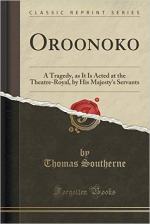
|
| Name: _________________________ | Period: ___________________ |
This test consists of 15 multiple choice questions and 5 short answer questions.
Multiple Choice Questions
1. Which slave says that he belonged to Oroonoko?
(a) Aboan.
(b) Blanford.
(c) Hottman.
(d) Slave One.
2. Why does Oroonoko stop Aboan from harming Hottman near the end of Act III, Scene IV?
(a) It would be too mean.
(b) It could ruin the plan.
(c) He needs Hottman.
(d) He does not want Aboan to become a murderer.
3. What is Blanford's reaction to the governor's actions at the end of Act IV, Scene II?
(a) Excitement.
(b) Shock.
(c) Encouragement.
(d) Bitterness.
4. What is the feeling in Act III, Scene II?
(a) Sad.
(b) Happy.
(c) Confusing.
(d) Despair.
5. To whom is the line "You are a Slave your self, and to command, Is now anothers right" being spoken to in Act III, Scene II?
(a) Imoinda.
(b) Oroonoko.
(c) Hottman.
(d) Aboan.
6. Why is Daniel irritated when he enters in Act IV, Scene I?
(a) Because his mother won't visit him.
(b) Because Lucy follows him everywhere.
(c) Because his mother won't leave him alone.
(d) Because Lucy refuses to sleep with him.
7. Who has a soliloquy in Act IV, Scene I?
(a) Mrs. Lackitt.
(b) Stanmore.
(c) Welldon.
(d) Jack.
8. What sort of tone does the conversation between Welldon and Jack have in Act IV, Scene I?
(a) Tragic.
(b) Angry.
(c) Humorous.
(d) Loving.
9. What is the widow's reaction to Welldon's statement in putting her off from marriage?
(a) Disgust.
(b) Outrage.
(c) Confusion.
(d) Happiness.
10. What does the line "...if you had not prevented my cutting his Throat, that Coward there had not discover'd us" refer to in Act IV, Scene II?
(a) Blanford's betrayal.
(b) Aboan's betrayal.
(c) Hottman's betrayal.
(d) The governor's betrayal.
11. Who are the two people who have betrayed Oroonoko in Act IV, Scene II?
(a) Governor and Blanford.
(b) Captain and Governor.
(c) Aboan and Hottman.
(d) Hottman and Governor.
12. What is Blanford trying to convince Oroonoko to do near the end of Act IV, Scene II?
(a) Yield.
(b) Cry.
(c) Eat.
(d) Beg.
13. For what purpose has Blanford brought Aboan to Oroonoko?
(a) To be his servant.
(b) To be his slave.
(c) To be his companion.
(d) To be his right-hand man.
14. What does Widow Lackitt threaten to do to Lucy in Act III, Scene III?
(a) Have her shipped back to London.
(b) Have her married to the Captain.
(c) Cut off the money promised to her.
(d) Annul her marriage to Daniel.
15. What does Welldon request of Stanmore near the end of Act IV, Scene I?
(a) To care for Lucy if something happens to him.
(b) To care for Oroonoko if something happens to him.
(c) To care for Mrs. Lackitt if something happens to him.
(d) To care for his cousin if something happens to him.
Short Answer Questions
1. To whom is Welldon speaking at the beginning of Act IV?
2. What does Lucy tell Welldon that she has heard about the slaves?
3. What is Aboan's idea for gaining freedom from slavery?
4. Who appears as the mediator?
5. What does Oroonoko stop Aboan from doing in Act III, Scene IV?
|
This section contains 511 words (approx. 2 pages at 300 words per page) |

|




